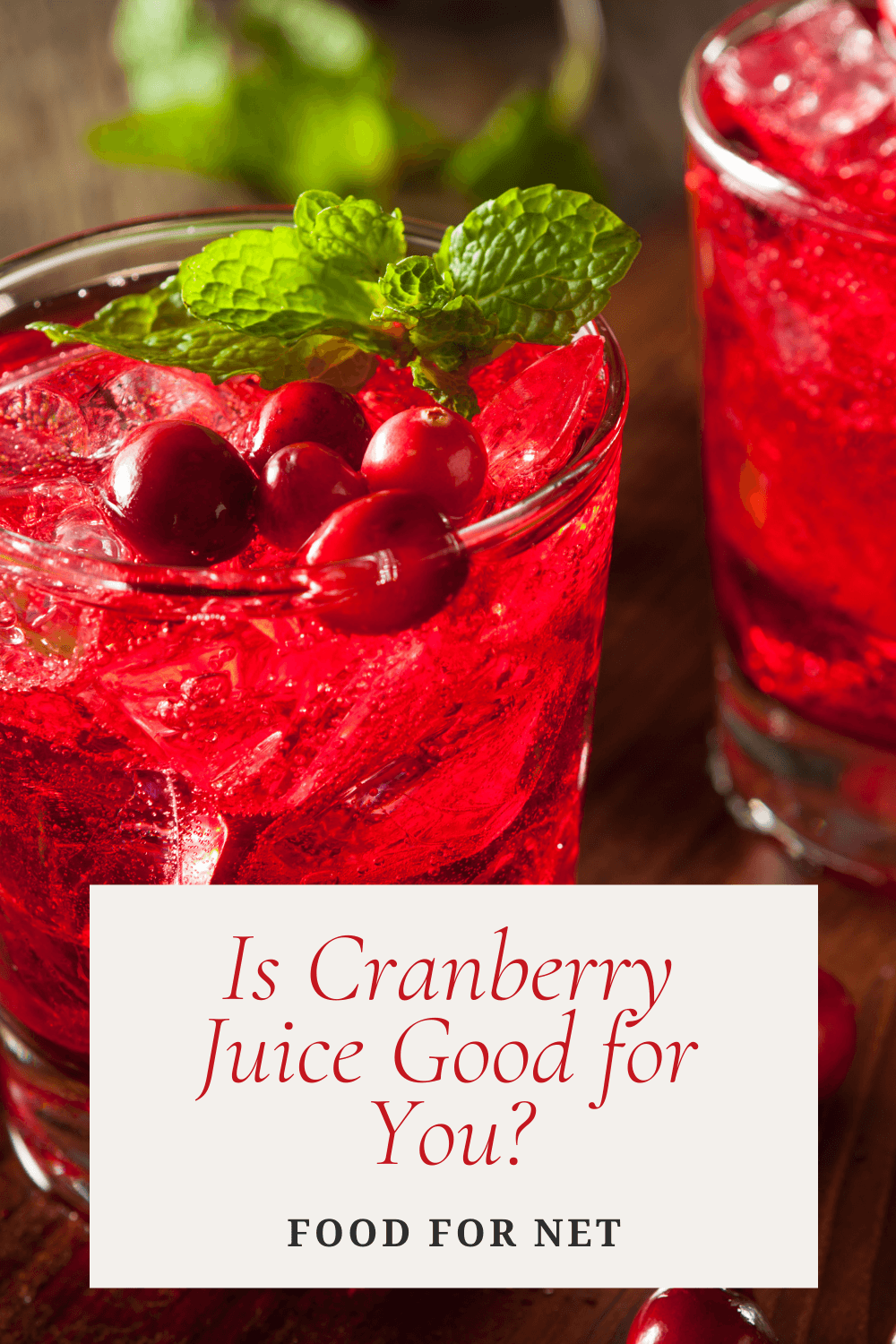
There’s something about cranberry juice that just screams fall and Thanksgiving, although many of us love the juice regardless of the season. It also turns out that cranberry juice is more than just a delicious treat. It offers a variety of benefits too, partly because of the antioxidant content. Before you rush off to grab a gallon of the juice, let’s answer this question: Is cranberry juice good for you?
Let me explain that question a little.
We often think about food as being healthy or unhealthy. If it’s healthy, then we can eat plenty of it without much stress. If it’s unhealthy, we need to be much more cautious. But, that idea is a gross oversimplification.
Most foods and drinks, including cranberry juice, aren’t healthy or unhealthy. Instead, they have a host of features. Some of those are helpful and others aren’t.
The health effects are also influenced by other parts of your diet. For example, if you’re eating plenty of fresh fruit and vegetables, including berries and dark leafy greens, then cranberry juice isn’t that powerful. In contrast, if your fresh fruit and vegetable intake is low, then the antioxidants in cranberry juice could be powerful.
Now that’s out of the way, let’s take a look at cranberry juice itself, shall we?
Is Cranberry Juice Good For You?
- What Is Cranberry Juice
- Benefits Of Cranberry Juice
- The Problems With Cranberry Juice
- Is White Cranberry Juice Good For You?
- Should You Try Diet Cranberry Juice?
- Final Thoughts
What Is Cranberry Juice?
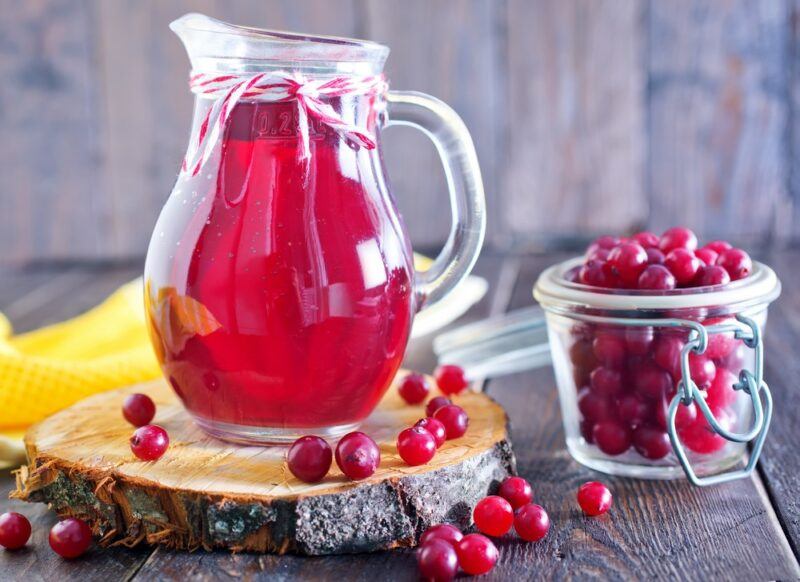
Asking what cranberry juice is might sound strange. It’s just juice from cranberries, right? Like orange juice comes from oranges and apple juice comes from apples.
In most cases, though, that claim isn’t precisely true. You’re rarely ever just buying cranberry juice, as cranberries have an incredibly tart flavor.
Instead, most cranberry juice products include other ingredients for sweetness. Many use other fruit juices, like apple juice, so you’re getting the sugar from a natural source.
Annoyingly, these products are often labeled as being 100% juice. It’s easy to miss the fact that only some of the juice comes from cranberries. Many brands don’t even tell you how much cranberry juice is in the final product.
You’ll also see cranberry juice cocktail. This type of drink still uses real cranberry juice, but refined sweeteners are added too, like high fructose corn syrup or sugar.
You end up getting extra sugar either way. The difference is simply where the sugar comes from. While 100% juice products are the healthiest of the two types, let’s not kid ourselves. Added sugar is added sugar and can still be harmful, even when it comes from fruit.
How To Find Real Cranberry Juice
There are some pure cranberry juice products out there. To find them, you’ll need to pay close attention to the ingredients list and how the product is described.
First, look for products marketed as 100% juice, ones that don’t have any added sugar. Then, make sure that there are no other types of juice included.
For example, Ocean Spray has a product called Pure Unsweetened Cranberry. The only ingredients are cranberry juice concentrate and water, and there are no added sugars. Another is called Just Cranberry Juice, which has the same ingredients list.
The only problem is that both products are made from concentrate. If this bothers you, you could try making cranberry juice yourself, using fresh cranberries. Doing so gives you full control over the ingredients. You can be confident that there are no unexpected additions.
Benefits Of Cranberry Juice
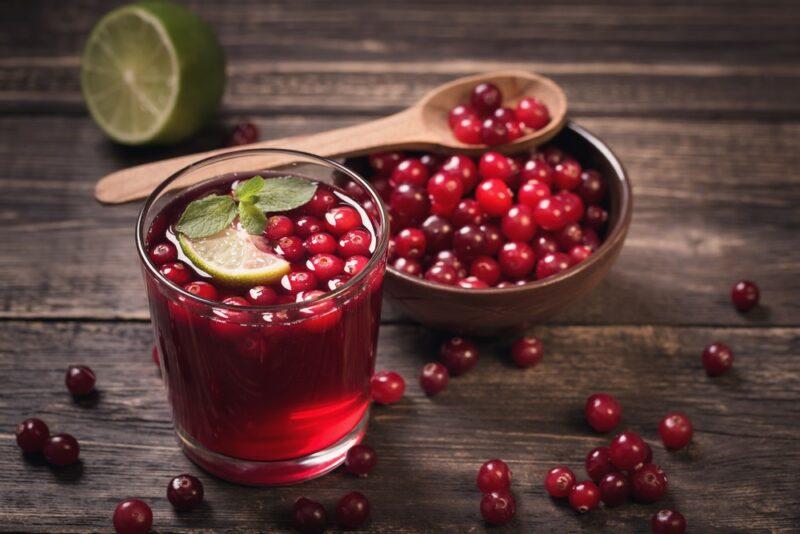
A Great Source Of Vitamins C And E
Cranberry juice is an easy way to get a hit of vitamin C and vitamin E, along with a variety of other nutrients. All the nutrients present can help to improve your health and protect against disease.
The vitamin C content might be particularly relevant in winter, where access to fresh fruit is limited and there are plenty of illnesses around.
There are some other nutrients present too, including copper and vitamin B6, along with smaller amounts of vitamin K, folate, calcium, and magnesium.
Plenty Of Antioxidants
Cranberries and cranberry juice contain plenty of antioxidants too. You’ve heard about antioxidants, right? They’re natural plant-based compounds and have been linked to more benefits than we can count.
Seriously, there are even claims that antioxidants can increase the length of your life, help reduce age-related problems like wrinkles, and decrease the risk of disease. There’s no guarantee that you’ll see all of these benefits from increasing your antioxidant intake, but it can’t hurt to try, right?
Cranberries don’t top the list of antioxidants in food (they’re not even close). This doesn’t mean that you should write them off though, as the goal shouldn’t be to maximize your antioxidant intake. You’re likely to see more benefits by consuming a wide variety of antioxidants instead.
After all, there are many individual types of antioxidants. Each type interacts with your body in a slightly different way.
May Prevent Urinary Tract Infections
The idea that cranberries can help with urinary tract infections is a famous one. It’s so well-known that it is almost folklore at this point, but is there any truth to the idea?
Studies have found some evidence that cranberry juice helps to reduce the risk of urinary tract infections (UTI). There are plenty of anecdotes to back that idea up too.
The effect was thought to be because cranberry juice makes the urine less acidic, so it’s more difficult for bacteria to grow. These days, theories suggest that the juice makes it harder for bacteria to stick to urinary tract walls.
However, the juice doesn’t appear to help if you already have a UTI. The effect also varies from person to person, so some people mightn’t experience any benefit from the juice at all.
The Problems With Cranberry Juice
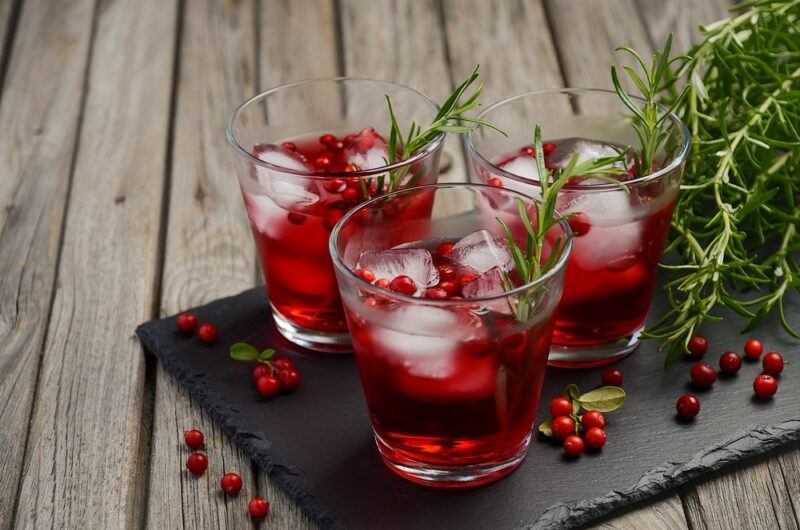
Can Be High In Sugar
The sugar content of cranberry juice varies depending on the product. Pure cranberry juice may have around 9 grams of sugar in an 8 fl. oz serving, while cranberry juice sweetened with other fruit sometimes have 23 grams of sugar for the same serving size.
This difference is shocking. In fact, an 8 fl. oz serving of sweetened cranberry juice has almost as much sugar as the same serving size of Coca-Cola. How’s that for disturbing?
Some products fall in the middle, like those marketed as low sugar cranberry juice. Still, it’s always important to check the ingredients label closely. Some low sugar products contain much more sugar than you might expect.
Cranberry Juice Is High In Oxalates
Oxalates are a natural compound that you find in some foods, including cranberries and cranberry juice. They’re not a huge problem, but they can increase the risk of kidney stones, especially if you’ve had one in the past.
The oxalates are even more significant if you’re starting to drink cranberry juice regularly for the potential health benefits. Having multiple glasses of cranberry juice each day, for example, could easily increase your kidney stone risk.
If you’re going to do this, make sure that you stay hydrated, as this will reduce the chance of kidney stones. It’s worth talking to your doctor as well, to find out whether kidney stones are likely to be an issue for you.
That being said, the link between cranberry juice and kidney stones has some unexpected twists. Research suggests that some features of cranberry juice might actually lower kidney stone risk. It’s difficult to know what this means in practice, making it important to still be cautious with your cranberry juice habit.
Interacts With Some Medications
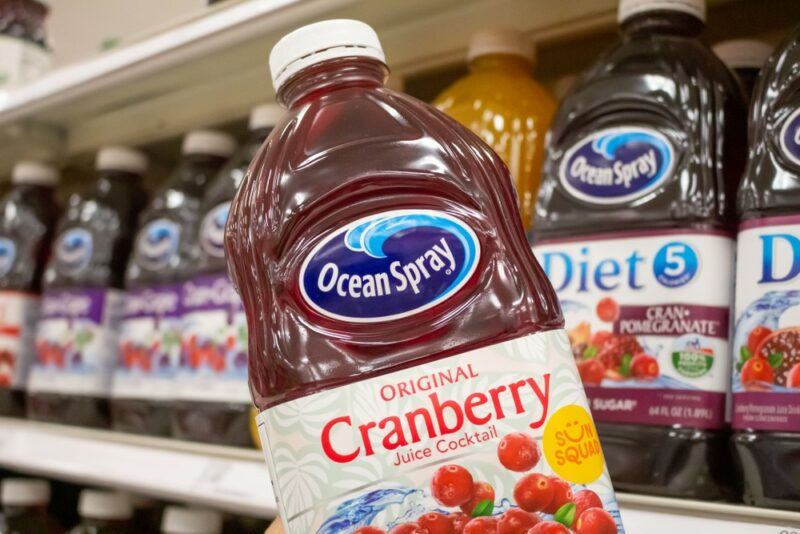
While cranberry juice is safe for most people, it can interact with some medications, particularly warfarin (used as a blood thinner). Compounds in cranberries can influence how fast warfarin breaks down, making it stay in the body for longer.
This effect doesn’t mean you need to avoid cranberry juice. Instead, anyone taking warfarin should talk to their doctor and have their blood tested regularly so their dose can be adjusted accordingly.
There are some other interactions too, particularly among medications that are broken down in the liver. The simplest solution is to talk to your doctor if you are on any type of medication. They’ll be able to tell you whether cranberry juice is an issue for you or not.
Can Irritate Your Bladder
Cranberry juice may be a poor choice for anyone with an overactive bladder, making symptoms worse and potentially leading to incontinence.
You’re Focusing On Liquid Calories
Any type of drink comes with an additional problem – you’re getting calories in the form of a liquid. This matters because our bodies don’t respond to liquid calories in the same way as calories from food.
In particular, we don’t get satisfied in the same way when we drink our calories. This makes it easy to overdo it.
Unsweetened cranberry juice shouldn’t be too much of an issue here, as the drink is very tart, so you won’t be drinking too much at a time. Sweetened juices, on the other hand, are something to be careful with. Try choosing your portion size ahead of time and sticking to it.
Also remember that most of your hydration should come from water, not fruit juice.
Is White Cranberry Juice Good For You?
White cranberries aren’t a different type of cranberry. Instead, they’re regular cranberries that have been harvested a few weeks earlier than normal.
While most types of fruit get sweeter as they mature, cranberries follow a different pattern. They get tarter instead, meaning that white cranberries end up being sweeter than red ones. Similarly, white cranberry juice is naturally sweeter than red cranberry juice.
Because white cranberries are the same fruit as red cranberries, they should have similar benefits. Indeed, there’s already evidence that both types are equally effective for fighting urinary tract infections.
However, white cranberries don’t contain the anthocyanin pigment molecules that you find in red cranberries. These anthocyanins are potent antioxidants, suggesting that white cranberries might have less antioxidant power than red ones.
Still, white cranberries do contain precursors to those pigment molecules. Those precursors may have some of the same effects in our bodies. More research is needed before we know whether this is the case or not.
These patterns suggest that white cranberry juice isn’t quite as powerful as red cranberry juice, but the effects might be close. The extra sweetness of white cranberries helps to tip the scales, as companies don’t need to focus on added sugar to give you a delicious drink.
Should You Try Diet Cranberry Juice?
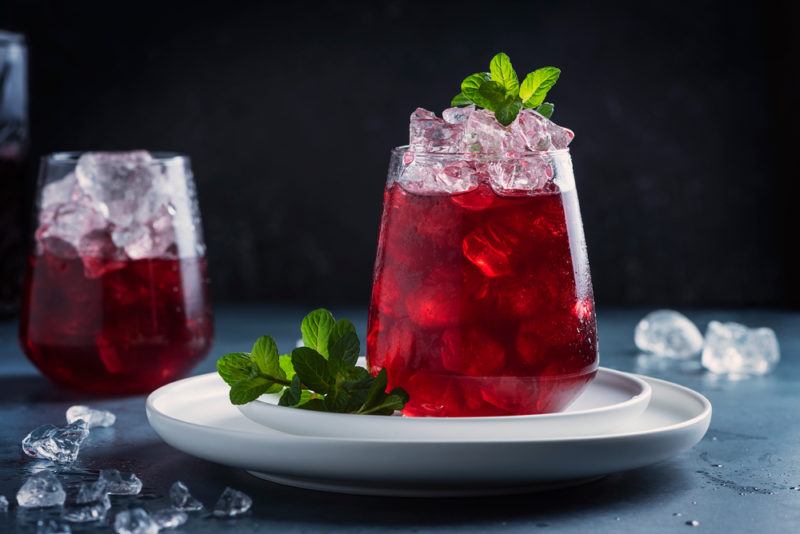
Diet cranberry juice sounds like a contradiction in terms, given that fruit naturally contains sugar. Yet, it’s a real product. Some brands, like Ocean Spray, even manage to keep the sugar content down to 1 gram of sugar per 8 fl. oz.
Keeping the sugar this low comes at a price though, as the juice (if we can even call it that) is heavily processed. For example, their Diet Cranberry Juice with Lime uses pectin, sucralose, red 40, and acesulfame potassium as ingredients.
The sucralose and acesulfame potassium are particularly concerning, as they’re both artificial sweeteners. As you probably know, there’s plenty of debate about whether artificial sweeteners are healthy or not.
They are officially considered safe, when consumed in limited quantities. Even so, there’s still the risk that the sweeteners can cause harm. They don’t offer any health benefits either, aside from helping you to avoid sugar.
Because of the controversy, many people choose to avoid artificial sweeteners as much as possible.
Plus, water is the first ingredient on the list for this product, rather than cranberry juice. This gives you a fairly dilute product. The red 40 coloring is the only reason that the juice still has the same red color that you find with real cranberry juice.
In the end, diet cranberry juice is typically just diluted cranberry juice with artificial or natural sweeteners to stop it from being too tart. The cranberry content will often be low, so the juice won’t offer most of the benefits that we’ve talked about in this list.
Why even bother with it?
Final Thoughts
Cranberry juice has some benefits and some risks. Thankfully though, it’s safe for most people, as long as you’re careful with your quantities and the products you choose.
The most important thing is to watch the sugar content. Pick unsweetened cranberry juice, whenever possible. Don’t worry if this is too tart, as you can always sweeten it with a little apple juice yourself. At least this way, you get to control the amount of sugar used.
And, like any food or drink, be careful about seeing cranberry juice as this amazing health tonic. You might see some benefits from the juice or from pomegranate juice, but there aren’t any guarantees (especially if you get plenty of antioxidants elsewhere).
Frequently Asked Questions
Is Cranberry Juice Acidic?
Fruit juices tend to be acidic. This is particularly true for cranberry juice, which has a pH of between 2.3 and 2.5 (in contrast, apple juice is between 3.3 and 4, while orange juice is between 3.3 and 4.2).
If you’re concerned about acidity, it’s best to focus on vegetable juices instead, like cabbage juice or carrot juice. These are much less acidic.
Is Cranberry Juice Good For Kidney Stones?
Cranberry juice is sometimes promoted as a way to flush kidney stones out, but it doesn’t have this effect. In fact, cranberry juice can increase the risk of kidney stones, as it is high in oxalates.
Because of this, anyone who has had kidney stones before or is predisposed to them may need to avoid cranberry juice and cranberry supplements.
Is Cranberry Juice Good For Diabetics?
Cranberry juice could be helpful in some ways because of the plant-based compounds it contains. Some of these may lower the risk of diabetes and diabetic complications. However, the juice is also high in sugar, so people with diabetes need to watch the amount they consume.
Is Cranberry Juice Good For A Yeast Infection?
Cranberry juice is often promoted as a home remedy for yeast infections and urinary tract infections, partly because it is acidic. Right now, the idea is mostly an urban legend, as researchers haven’t been able to prove it one way or another.
Still… the potential is there, especially as cranberry juice has already been linked to decreased risk of urinary tract infections.
How Much Cranberry Juice Should You Drink A Day?
For most people, an 8 ounce glass of cranberry juice should be more than enough. You might go up to 16 ounces, but more than that a day isn’t wise, as the juice is high in sugar.
The product you choose matters as well. Look for ones with a decent percentage of cranberry juice (ideally 25% or above) and not too much added sugar. You could turn to diet cranberry juice as well, which contains less sugar, but those products often rely on artificial sweeteners.


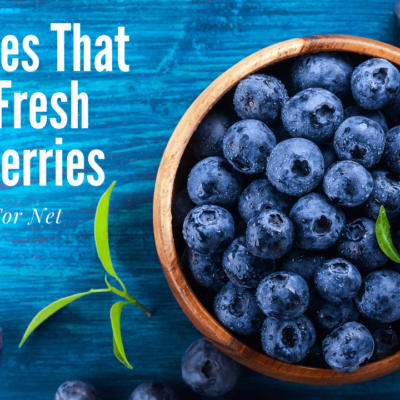





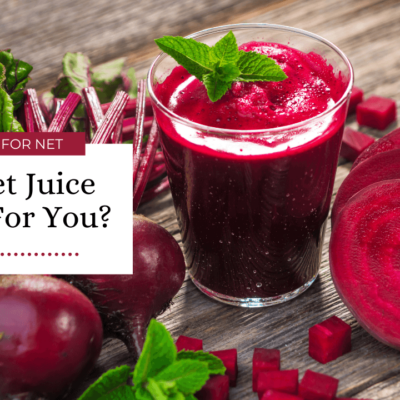


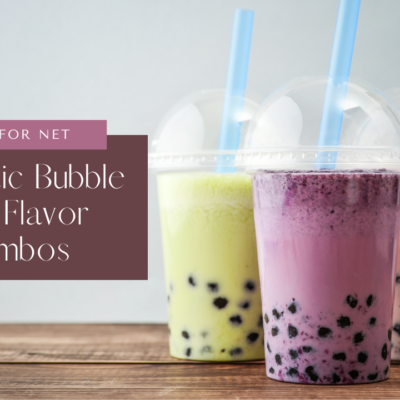



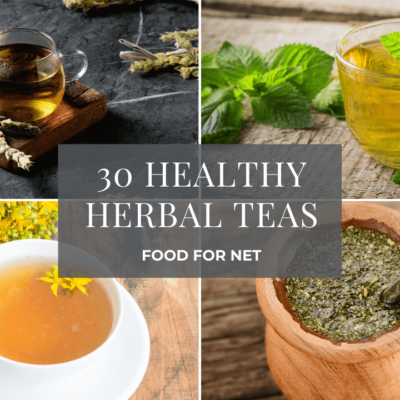

 The Best Cream Liqueur
The Best Cream Liqueur
Leave a Reply